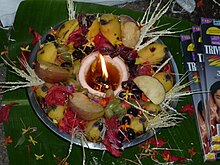
Thalappoli is a ritual ceremony performed as a vow in Hindu temples in Kerala, India. It is also performed to usher the bride and groom to the wedding hall and the special guests to public events.
Ritual

Thalappoli is a ritual ceremony performed as a vow in Hindu temples in Kerala, India. Bathed and dressed in beautiful traditional clothes and Kerala ornaments, the women, mainly girls, line up with holding a thalam (a metal plate) in their hands filled with fresh paddy, flowers, rice, coconut (usually broken into two pieces), a lighted lamp and go around the temple with kurava (traditional form of sound), shouts and playing of instruments. This was regularly practiced in the temples of bhagavathy (Bhadrakali).
Thalappoli festivalis observed in many Hindu temples across Kerala. some noted temples include Kodungallur Bhagavathy Temple, Pattupurackal Bhagavathy Temple, Chengannur Mahadeva Temple, Thalappoli performed by virgins girls is an important ceremony in Attukal Temple. Pilleru thalappoli, the thalappoli by kids is performed at Guruvayur temple. In Kottankulangara Devi Temple in Chavara, there is a special ritual where men dress up as women and perform thalappoli.
Origin
In Kerala Hindu culture, it is considered auspicious to see the ashta mangalyas (eight blessed elements) - a mirror, a lamp, a vessel filled with water, a new garment, akshatham (the combination of rice and paddy), gold, a girl, and Kurava (a sound that signifies happiness). It is believed that its simplified form was transformed into talappoli.
There is another argument that 'Thalappoli' is related to Buddhism and Jainism that existed in Kerala.
Non-ritual
Now Thalapoli is also performed to usher the bride and groom to the wedding hall and the special guests to public events.
See also
References
- "താലപ്പൊലി". Archived from the original on 2023-02-24. Retrieved 2023-02-24.
- "Thalappoli – Traditions Of Kerala". Organikos. 14 June 2013. Archived from the original on 24 February 2023. Retrieved 24 February 2023.
- Balasubramanian, Lalitha (2015-08-19). Kerala ~ The Divine Destination. One Point Six Technology Pvt Ltd. ISBN 978-93-81576-23-6.
- "കൊടുങ്ങല്ലൂർ താലപ്പൊലി: ആനപ്പന്തലിന് കാൽനാട്ടി". Deshabhimani (in Malayalam). Archived from the original on 2023-02-24. Retrieved 2023-02-24.
- Daily, Keralakaumudi. "പാട്ടുപുരയ്ക്കൽ താലപ്പൊലി മഹോത്സവം". Keralakaumudi Daily (in Malayalam). Archived from the original on 2023-02-24. Retrieved 2023-02-24.
- Daily, Keralakaumudi. "ഭക്തിയുടെ നിറവിൽ ചെങ്ങന്നൂർ ദേവിക്ക് തൃപ്പൂത്താറാട്ട്". Keralakaumudi Daily (in Malayalam). Archived from the original on 2023-02-24. Retrieved 2023-02-24.
- "ദേവിയുടെ ഭടന്മാരെ അനുസ്മരിക്കാന് ശൂലം കുത്തല്..വിചിത്രമായ ആചാരങ്ങളുള്ള സ്ത്രീ ശബരിമല". Archived from the original on 2023-11-07. Retrieved 2023-02-24.
- "ഗുരുവായൂരിൽ പിള്ളേര് താലപ്പൊലി നാളെ, ക്ഷേത്രം നേരത്തെ അടയ്ക്കും". ManoramaOnline (in Malayalam). Archived from the original on 2023-02-24. Retrieved 2023-02-24.
- "Culture & Heritage | District Kollam, Government of Kerala | India". Archived from the original on 2023-02-24. Retrieved 2023-02-24.
- ^ Haridas, Harikrishnan (26 September 2019). "താലപ്പൊലിയെടുക്കല്". Kesari Weekly. Kesari. Archived from the original on 24 February 2023. Retrieved 24 February 2023.
